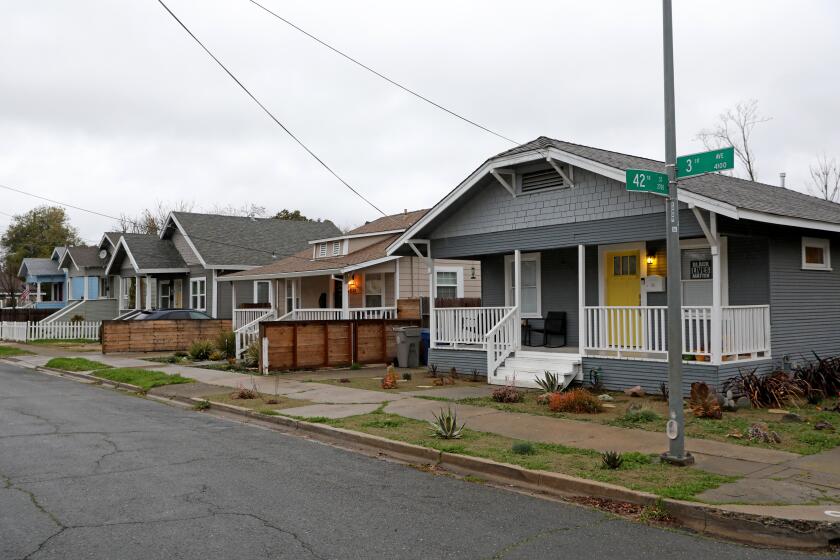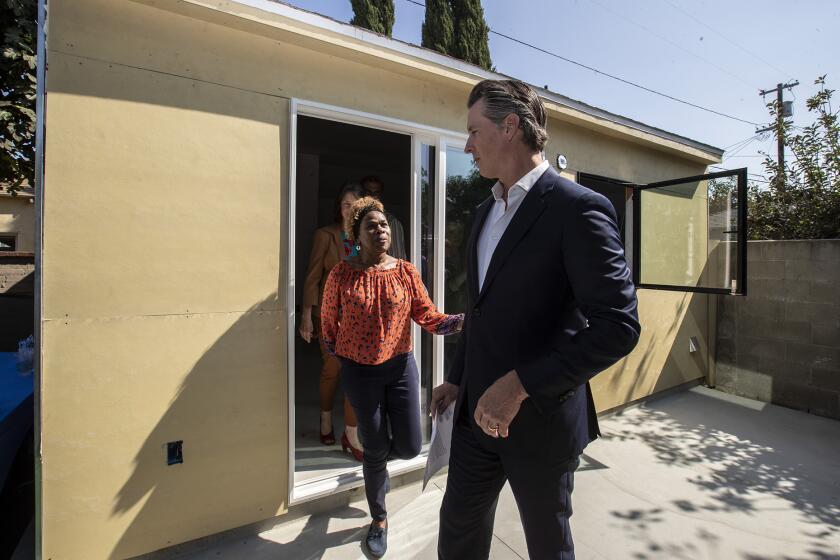Law that ended single-family zoning is struck down for five Southern California cities

- Share via
A Los Angeles County Superior Court judge has ruled that a landmark law ending single-family-home-only zoning in California is unconstitutional, a decision that could lead to the law being invalidated in the state’s largest cities.
Judge Curtis Kin determined that Senate Bill 9 does not provide housing restricted for low-income residents and therefore cannot override state constitutional protections afforded to local zoning practices.
“Because the provisions of SB 9 are not reasonably related and sufficiently narrowly tailored to the explicit stated purpose of that legislation — namely, to ensure access to affordable housing — SB 9 cannot stand,” Kin wrote in a April 22 ruling.
Kin’s decision now applies to the five Southern California cities — Redondo Beach, Carson, Torrance, Whittier and Del Mar — that challenged SB 9, which passed in 2021. If his ruling is appealed and upheld, it would affect 121 communities known as “charter cities,” including Los Angeles, San Diego and San Francisco, that have greater autonomy under state law.
Redondo Beach City Atty. Michael Webb hailed the ruling as a victory for communities fighting against state overreach on housing laws. State lawmakers have passed SB 9 and other “one-size-fits-all” measures in recent years without regard for how they would affect the ability to provide water, policing, fire and other municipal services, and without guaranteeing new development would help those most in need, he said.
“SB 9 had all the bad impacts on disrupting the community with none of the positive features of ensuring affordable housing actually be built,” Webb said.
A spokesperson for Atty. Gen. Rob Bonta, whose office defended the law, said the attorney general is reviewing the decision “and will consider all options in defense of SB 9.”
California state officials are on the verge of ending zoning for single-family housing.
SB 9 is one of the highest-profile laws approved in response to California’s housing affordability problems as Gov. Gavin Newsom and state lawmakers have aimed to spur new homebuilding.
The law affects vast swaths of the state. Between half and three-quarters of the developable land in much of the state would be reserved only for single-family homes if not for SB 9, according to UC Berkeley’s Terner Center for Housing Innovation. Under the law in most cases, property owners statewide can build up to four units on those lots.
So far, SB 9’s effects have been muted, especially compared to a series of state laws first passed in 2016 that aimed to increase the construction of smaller, secondary units, known as ADUs or casitas, on single-family home parcels.
Bay Area NPR affiliate KQED recently surveyed 16 cities of varying sizes across California and found that between 2022 and 2023, the cities approved 75 lot split applications and 112 applications for new units under SB 9. Over the same period, those cities permitted 8,800 ADUs, the news organization found.
Over the past four years, lawmakers have quietly chipped away at zoning communities for single-family homes only, opening the door to smaller backyard units.
But SB 9 is as much about symbolism as new housing. The lifestyle afforded by owning a suburban single-family home with a backyard and barbecue has long been mythologized as part of the “California Dream.” Allowing multiple units to be built on parcels previously reserved only for single-family homes departs from that vision. In defense of SB 9, lawmakers argued that all areas of the state needed to accept growth and often cited the origins of single-family-home-only zoning as a means of excluding Black and other nonwhite residents from neighborhoods.
Legislators reasoned that individual units in duplexes, triplexes and fourplexes would be more affordable than just one house on the land, and that more housing in general would ease affordability pressures. But, citing the costs to build, they did not mandate any units constructed under SB 9 specifically to be set aside for low-income residents.
The five cities, which have been some of the most aggressive in pushing back against state attempts to promote more housing, argued that distinction mattered.
Kin agreed. The law’s stated intent calls for increasing access to “affordable housing,” a term that Kin said elsewhere in the text refers explicitly to housing restricted for low-income residents. Because SB 9 doesn’t require those kinds of developments, it fails to meet the state Constitution’s high standards to override local control over zoning in charter cities, Kin said.
“In order to justify SB 9’s interference with the municipal concerns of land use and zoning regulations, the Legislature cannot rely on a potential, eventual decrease in prices resulting from increased housing supply to demonstrate that SB 9 would increase the supply of affordable (i.e. below market-rate) housing,” Kin wrote.
This is Essential Politics, our daily look at California political and government news.
But Chris Elmendorf, a law professor at UC Davis who closely follows state housing legislation and litigation, criticized Kin’s reading of the law.
Kin’s analysis of the “affordable housing” language in SB 9 means that the judge believes that lawmakers intended to create housing restricted to low-income residents without actually mandating it in the law, he said.
“The only way that interpretation is right is if the Legislature is a house full of idiots,” Elmendorf said. “If that was their purpose, they would have required some of the units to be sold or rented at below-market rates.”
Elmendorf said he expected Bonta, who has made enforcing state housing laws a priority while in office, to appeal the decision. State lawmakers also easily could change SB 9 to address Kin’s decision, he said.
State Sen. Toni Atkins (D-San Diego), who authored the law while she was leader of that chamber, said in a statement that she was considering doing so.
“The goal of SB 9 has always been to increase equity and accessibility in our neighborhoods while growing our housing supply and production across the state,” Atkins said, adding that she believed Kin’s decision was “very disappointing and sadly misguided.”
In the judge’s defense, Webb, the Redondo Beach city attorney, said state lawmakers have written numerous other housing laws where their stated intent matched the language in the bill. Lawmakers could amend SB 9, he said, to mandate it produce low-income housing.
“The Legislature can address [the ruling] by putting the words in the initiative to match the intent, which is if you’re tearing down a single-family home, it would be replaced with affordable housing,” Webb said.
More to Read
Sign up for Essential California
The most important California stories and recommendations in your inbox every morning.
You may occasionally receive promotional content from the Los Angeles Times.









